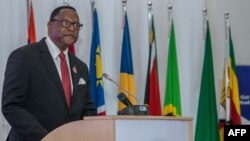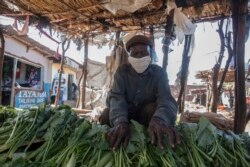Malawi's president has announced a plan to help the country's struggling economy recover from the impact of the COVID-19 pandemic. The plan, which includes government-wide spending cuts, follows nationwide protests against the high cost of living in Malawi, one of Africa's poorest nations.
President Lazarus Chakwera’s economic recovery plan was announced two days after Chakwera’s predecessor, Peter Mutharika, criticized the Chakwera administration for ruining the country's economy.
It also follows a series of nationwide protests against the high cost of living, driven by inflation, which has reached 11%.
During his national address Tuesday evening, Chakwera acknowledged there are economic problems facing the country.
“Our economy is bleeding from four wounds at once. The first long term wound our economy is suffering from is its structural limitations, for ours is an agro-based economy that has a narrow production base,” Chakwera said.
He said as such any plan must help restructure the economy by stimulating sectors like mining, infrastructure development and manufacturing.
However, Chakwera said the main cause of the country’s economic slowdown is COVID-19.
“The third long-term wound our economy is bleeding from is the COVID-19 pandemic, which is now in its fourth wave of not only infecting swathes of the population, but also tearing into the very fabric of our economic development,” Chakwera said.
Since the onset of the pandemic last year, Malawi has registered over 60,000 cases and more than 2,300 deaths. Twice, the government has declared a national disaster, with accompanying restrictions of movement.
Chakwera said although the restrictions have saved lives, they have caused inevitable damage to livelihoods.
“Towards that end, the social economic plan I am announcing today, included interventions aimed at intensifying efforts aimed to vaccinate the population. So far only half a million people are fully vaccinated, which is less than 5% of the targeted 11 million people to reach herd immunity,” Chakwera said.
As part of the enforcement of the plan, Chakwera ordered government officials to emulate his example by reducing spending.
“I am already scaling my travel plan for the recovery period, so I expect every ministry under my administration to do the same,” he said.
Betchani Tchereni, a lecturer in economics at the Malawi University of Business and Applied Sciences, commends the plan but says it falls short on practical ways for Malawi to increase its export base.
“We must know that as long as we continue to be an importing country, our inflation is not going to go down at all. The cost of living is going either rise or be where it is now. Why? Because we’re not producing our own commodities. And if you look at this plan, it is not meant to trigger manufacturing,” Tchereni said.
Despite a government promise to modernize and industrialize the economy, nearly 80% of Malawians are employed in agriculture, according to a recent World Bank report.





